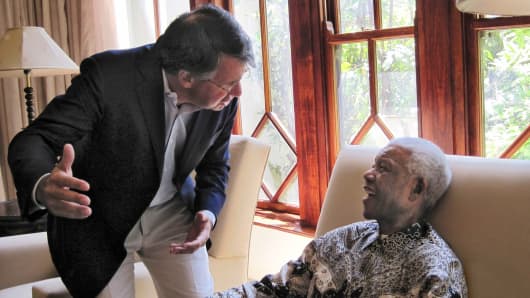However, Nelson Mandela was always in my mind and consciousness.
(His life in photos: Nelson Mandela: A man and his country)
We did not know what he looked like and could not read anything he had written. His organization, the African National Congress, was banned and, as we were constantly reminded, a terrorist organization. I couldn't wait to leave South Africa, organize boycotts of South African products, protest in Trafalgar Square in London and pretend to be from Zimbabwe — and that is exactly what I did as soon as I graduated from high school.
Many people have written about their experiences meeting with Madiba (what many South Africans call Mandela) and how struck they were by his warmth and authenticity. When I visited him at his home one Saturday afternoon in 2009, I was clearly in awe. Within moments, however, he put me at ease with his sense of humor ("You know who I am, it's good to meet you."), his sincere interest in my family and me and how he listened so carefully and answered my questions with patience and consideration. That afternoon Madiba gave me advice around leadership, being a "true African" and understanding that the person who brought me to see him, my friend Blaise Judja-Sato from Cameroon, was really my brother from another mother.
(Read more: Richard Branson: Mandela embraced free markets, too)
Two decades earlier, on February 11, 1990, my wife Debbie, who was pregnant with our first child, and I watched the broadcast of Madiba leaving prison to begin the next chapter of his extraordinary life. Inspired by the hope for the future that he represented, Debbie and I decided to name our son, born a few months later, Alex Nelson Klein. When I shared that story with Madiba almost 20 years later at his home in Johannesburg, he was very amused to hear that most of our English friends wanted to know why we had named our son after a British admiral! (Horatio Nelson was an officer in the Royal Navy, famous for helping Britain defeat France and Spain in one of the most notable battles of the Napoleonic Wars.)
Madiba's influence has guided me throughout my life and inspired me to take action on the issues I hold dear. This work is personally rewarding beyond measure: A commitment to global health and defeating HIV/AIDS; a deep involvement in Africa and the founding of The Elders; with Madiba's blessing, building a conservation and tourism business in South Africa; an abiding focus on children and education; a heartfelt commitment to international press freedom; and building the leadership model and principles under which we all operate at Getty Images.
(Read more: What Nelson Mandela meant to South Africa's economy)
Nelson Mandela made the seemingly impossible achievable. He has always been my hero and although this is a time of sadness and reflection, it is one when I feel proud to be South African.
Jonathan Klein is co-founder and CEO of Getty Images. He serves on the boards of directors of the Committee to Protect Journalists and Grassroot Soccer. He is chairman of Friends of the Global Fight Against AIDS, Tuberculosis and Malaria and is vice president of the board of trustees of the Groton School.


